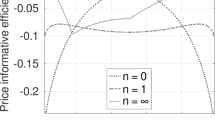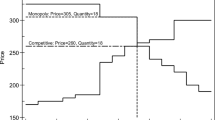Abstract
This paper studies the consequences of removing the resampling assumption from the zero-intelligence trading model in Gode and Sunder (1993). We obtain three results. First, individual rationality is no longer sufficient to attain allocative efficiency in a continuous double auction; hence, the rules of the market matter. Second, the allocative efficiency of the continuous double auction is higher than for other sequential protocols both with or without resampling. Third, compared to zero intelligence, the effect of learning on allocative efficiency is sharply positive without resampling and mildly negative with resampling.
Access this chapter
Tax calculation will be finalised at checkout
Purchases are for personal use only
Preview
Unable to display preview. Download preview PDF.
Similar content being viewed by others
References
P.J. Brewer, M. Huang, B. Nelson, and C.R. Plott. On the behavioral foundations of the law of supply and demand: Human convergence and robot randomness. Experimental Economics, 5: 179-208, 2002.
S. Gjerstad. The competitive market paradox. Journal of Economic Dynamics and Control, 31: 1753-1780, 2007.
S. Gjerstad and J. Dickhaut. Price formation in double auctions. Games and Economic Behavior, 22:1-29, 1998.
S. Gjerstad and J.M. Shachat. Individual rationality and market efficiency. wp 1204, August. IRBEMS, Krannert School, Purdue University, 2007.
D.K. Gode and S. Sunder. Allocative efficiency of markets with zero intelligence traders: Market as a partial substitute for individual rationality. Journal of Political Economy, 101:119-137, 1993.
L. Hurwicz, R. Radner, and S. Reiter. A stochastic decentralized resource allocation process: Part I. Econometrica, 43:187-222, 1975.
M. LiCalzi and P. Pellizzari. The allocative effectiveness of market protocols under intelligent trading. In C. Bruun, editor, Advances in Artificial Economics, pages 17-29. Springer, Berlin, 2006.
M. LiCalzi and P. Pellizzari. Simple market protocols for efficient risk sharing. Journal of Economic Dynamics and Control, 31:3568-3590, 2007a.
M. LiCalzi and P. Pellizzari. Which market protocols facilitate fair trading? In A. Consiglio, editor, Artificial Markets Modeling, pages 81-97. Springer, Berlin, 2007b.
P. Mirowski. Markets come to bits: Evolution, computation and markomata in economic science. Journal of Economic Behavior and Organization, 63:209-242, 2007.
Author information
Authors and Affiliations
Editor information
Editors and Affiliations
Rights and permissions
Copyright information
© 2008 Springer-Verlag Berlin Heidelberg
About this chapter
Cite this chapter
LiCalzi, M., Pellizzari, P. (2008). Zero-Intelligence Trading Without Resampling. In: Schredelseker, K., Hauser, F. (eds) Complexity and Artificial Markets. Lecture Notes in Economics and Mathematical Systems, vol 614. Springer, Berlin, Heidelberg. https://doi.org/10.1007/978-3-540-70556-7_1
Download citation
DOI: https://doi.org/10.1007/978-3-540-70556-7_1
Publisher Name: Springer, Berlin, Heidelberg
Print ISBN: 978-3-540-70553-6
Online ISBN: 978-3-540-70556-7
eBook Packages: Business and EconomicsEconomics and Finance (R0)




